Evan Roskos's Blog, page 6
March 3, 2013
Whitman: Does the daylight astonish? (2 days to DR. BIRD)
One of the key quotes from
Dr. Bird's Advice for Sad Poets
can be found in this passage.
"Do you guess I have some intricate purpose?
Well I have, for the Fourth-month showers have, and the mica on the side of a rock has.
Do you take it I would astonish?
Does the daylight astonish? does the early redstart twittering through the woods?
Do I astonish more than they?
This hour I tell things in confidence,
I might not tell everybody, but I will tell you."
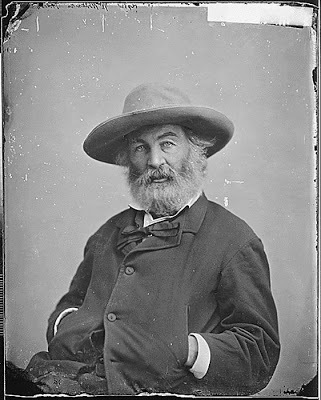
"Do you guess I have some intricate purpose?
Well I have, for the Fourth-month showers have, and the mica on the side of a rock has.
Do you take it I would astonish?
Does the daylight astonish? does the early redstart twittering through the woods?
Do I astonish more than they?
This hour I tell things in confidence,
I might not tell everybody, but I will tell you."

Published on March 03, 2013 07:00
March 2, 2013
Whitman: I know I am deathless (3 days to DR. BIRD)
Belief in immortality came easily to Whitman, who saw the biological processes of the natural world as carrying his remains forever onward.
"I know I am solid and sound,
To me the converging objects of the universe perpetually flow,
All are written to me, and I must get what the writing means.
I know I am deathless,
I know this orbit of mine cannot be swept by a carpenter's compass,
i know I shall not pass like a child's carlacue cut with a burnt stick at night.
I know I am august,
I do not trouble my spirit to vindicate itself or be understood,
I see that the elementary laws never apologize,
(I reckon I behave no prouder than the level I plant my house by, after all.)
I exist as I am, that is enough,
If no other in the world be aware I sit content,
And if each and all be aware I sit content."
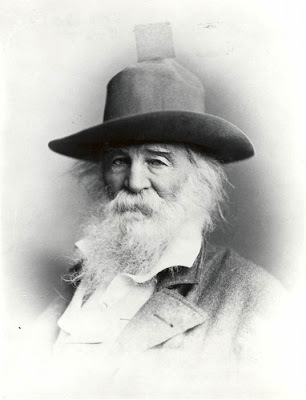 "I exist as I am, that is enough"
"I exist as I am, that is enough"
"I know I am solid and sound,
To me the converging objects of the universe perpetually flow,
All are written to me, and I must get what the writing means.
I know I am deathless,
I know this orbit of mine cannot be swept by a carpenter's compass,
i know I shall not pass like a child's carlacue cut with a burnt stick at night.
I know I am august,
I do not trouble my spirit to vindicate itself or be understood,
I see that the elementary laws never apologize,
(I reckon I behave no prouder than the level I plant my house by, after all.)
I exist as I am, that is enough,
If no other in the world be aware I sit content,
And if each and all be aware I sit content."
 "I exist as I am, that is enough"
"I exist as I am, that is enough"
Published on March 02, 2013 07:00
March 1, 2013
Whitman: Through me forbidden voices (4 days to DR. BIRD)
This passage contains lines that always get my students to giggle or act uncomfortable, but it's an essential concept in Whitman's writing. Basically, he sees nothing distasteful or vulgar in the human body, and what better way to express this than to suggest he treats both his face and his bowels with respect (the interpretation here is either that he eats well or that he is physically gentle and respectful to his body -- either way, it leads to his claim that his arm pits smell divine!).
"Through me forbidden voices,
Voices of sexes and lusts, voices veil'd and I remove the veil,
Voices indecent by me clarified and transfigur'd.
I do not press my fingers across my mouth,
I keep as delicate around the bowels as around the head and heart,
Copulation is no more rank to me than death is.
I believe in the flesh and appetites,
Seeing, hearing, feeling, are miracles, and each part and tag of me is a miracle.
Divine am I inside and out, and I make holy whatever I touch or am touch'd from,
The scent of these arm-pits aroma finer than prayer,
This head more than churches, bibles, and all the creeds."
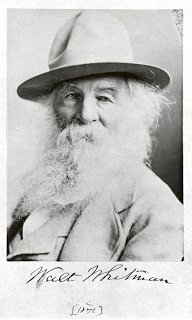 "If I worship one thing more than another it shall be the spread of my own body, or any part of it"
"If I worship one thing more than another it shall be the spread of my own body, or any part of it"
"Through me forbidden voices,
Voices of sexes and lusts, voices veil'd and I remove the veil,
Voices indecent by me clarified and transfigur'd.
I do not press my fingers across my mouth,
I keep as delicate around the bowels as around the head and heart,
Copulation is no more rank to me than death is.
I believe in the flesh and appetites,
Seeing, hearing, feeling, are miracles, and each part and tag of me is a miracle.
Divine am I inside and out, and I make holy whatever I touch or am touch'd from,
The scent of these arm-pits aroma finer than prayer,
This head more than churches, bibles, and all the creeds."
 "If I worship one thing more than another it shall be the spread of my own body, or any part of it"
"If I worship one thing more than another it shall be the spread of my own body, or any part of it"
Published on March 01, 2013 07:00
February 28, 2013
Whitman: Speech is the twin of my vision (5 days to DR. BIRD)
With only five days until the release of Dr. Bird, I give you one of the passages James thinks about early on in the novel.
"Dazzling and tremendous how quick the sun-rise would kill me,
If I could not now and always send sun-rise out of me.
We also ascend dazzling and tremendous as the sun,
We found our own O my soul in the calm and cool of the day-break.
My voice goes after what my eyes cannot reach,
With the twirl of my tongue I encompass worlds and volumes of worlds.
Speech is the twin of my vision, it is unequal to measure itself,
It provokes me forever, it says sarcastically,
Walt you contain enough, why don't you let it out then?"
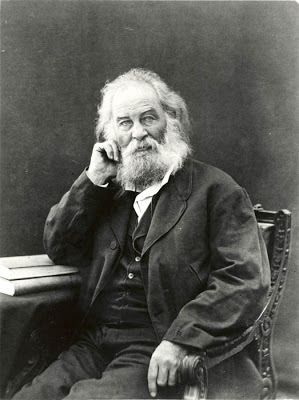 "Come now I will not be tantalized, you conceive too much of articulation"
"Come now I will not be tantalized, you conceive too much of articulation"
"Dazzling and tremendous how quick the sun-rise would kill me,
If I could not now and always send sun-rise out of me.
We also ascend dazzling and tremendous as the sun,
We found our own O my soul in the calm and cool of the day-break.
My voice goes after what my eyes cannot reach,
With the twirl of my tongue I encompass worlds and volumes of worlds.
Speech is the twin of my vision, it is unequal to measure itself,
It provokes me forever, it says sarcastically,
Walt you contain enough, why don't you let it out then?"
 "Come now I will not be tantalized, you conceive too much of articulation"
"Come now I will not be tantalized, you conceive too much of articulation"
Published on February 28, 2013 07:00
February 27, 2013
Whitman: This then is life (6 days to DR. BIRD)
One of my favorite quotations from Leaves of Grass was going to be the epigraph. But I decided to leave the quotation in the text only, since it comes to James at a powerful moment in the novel.
"Victory, union, faith, identity, time,
The indissoluble compacts, riches, mystery,
Eternal progress, the cosmos, and the modern reports.
This then is life,
Here is what has come to the surface after so many throes and convulsions.
How curious! how real!"
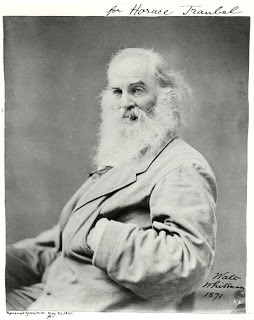 "Underfoot the divine soil, overhead the sun."
"Underfoot the divine soil, overhead the sun."
"Victory, union, faith, identity, time,
The indissoluble compacts, riches, mystery,
Eternal progress, the cosmos, and the modern reports.
This then is life,
Here is what has come to the surface after so many throes and convulsions.
How curious! how real!"
 "Underfoot the divine soil, overhead the sun."
"Underfoot the divine soil, overhead the sun."
Published on February 27, 2013 07:00
February 26, 2013
Review: Everybody Loves Our Town: An Oral History of Grunge

Everybody Loves Our Town: An Oral History of Grunge by Mark Yarm
My rating: 5 of 5 stars
A fantastic history of the Seattle music scene labelled grunge. Yarm's strength is, aside from the wealth of material he culled from his interview subjects, is the fact that he knows the scene. The book begins back in the early 80s and successfully traces the rise of the huge bands as well as the ones (like TAD) that could've made it big but didn't for reasons random, sometimes cruel, sometimes understandable, but ultimately fascinating.
Working with the structure of an oral history still leaves Yarm room to create a narrative. Juxtaposing contradictory perspectives allows for a certain sense of tribulation -- who do we believe if there are only two presentations of an event? Well, Yarm's done us the service of staying out of the way. Put another text might make conclusions based on the comments/quotes, but Yarm emphasizes that the issue here isn't really the factual trajectory of the individuals, but the overall movement. For example, who knows if Courtney Love is telling the truth. Ever. And who knows if anyone talking about Courtney Love is telling the truth or has a grudge. I want to give people the benefit of the doubt, but ultimately how people talk about the scene tells you more than the facts. Maybe that's not what everyone expects but if you go in looking for a beautiful mix of insider gossip, facts, perceptions, and caricature (not one of those things but all).
A highly satisfying presentation that moves quickly and doesn't seem to lack anything essential (except maybe Chris Cornell's post-Soundgarden decent into drugs and alcohol, though I suspect the blind spot was intentional and not due to a lack of interest or work on Yarm's part).
View all my reviews
Published on February 26, 2013 09:28
Whitman: Who degrades or defiles (7 days to DR. BIRD)
In my novel Dr. Bird's Advice for Sad Poets, the main character's name is James Whitman. He's not related to the poet, but it's one of those great things about life that sometimes the connections that seem obvious are the ones that will help the most. In fact, I didn't include James's discovery of the poet in the novel itself, but did write a short story that helps explain his initial reaction to Whitman's beautifully meandering poetry. Regardless, we don't need to know James's full experience of Whitman, just that he's decided to use Whitman as part of his self-therapy cocktail. The imaginary Dr. Bird, Whitman, photography, poem writing, and friends all contribute to keeping James afloat. But they are not enough.
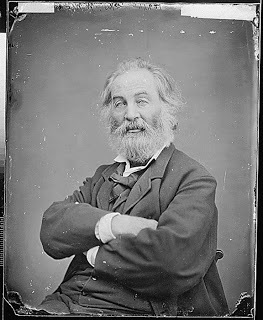 "the living human body"
"the living human body"
Who degrades or defiles the living human body is cursed.
Who degrades or defiles the body of the dead is not more cursed.
 "the living human body"
"the living human body"
Published on February 26, 2013 07:00
February 25, 2013
Whitman: the writer of melodious verses (8 days to DR. BIRD)
At one point, James finds himself at odds with Whitman. It's bad enough he's a sixteen-year-old wrestling with depression, talking to an imaginary pigeon, and failing his sister -- but fighting with a long-dead poet? James might be hopeless!
"You think it would be good to be the writer of melodious verses,
Well it would be good to be the writer of melodious verses;
But what are verses beyond the flowing character you could have? . . . . or beyond beautiful manners and behavior?
Or beyond one manly or affectionate deed of an apprenticeboy? . . or old woman? . . or man that has been in prison or is likely to be in prison?"
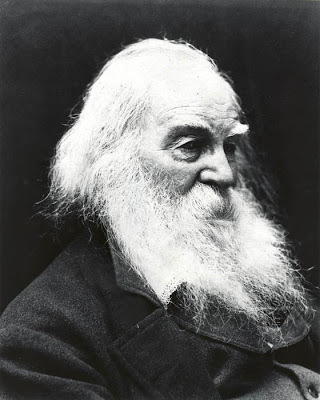
"You think it would be good to be the writer of melodious verses,
Well it would be good to be the writer of melodious verses;
But what are verses beyond the flowing character you could have? . . . . or beyond beautiful manners and behavior?
Or beyond one manly or affectionate deed of an apprenticeboy? . . or old woman? . . or man that has been in prison or is likely to be in prison?"

Published on February 25, 2013 07:00
February 24, 2013
Whitman: Great is the earth (9 days to DR. BIRD)
In Dr. Bird's Advice for Sad Poets, James finds himself challenged to be optimistic when he learns something grim about his sister Jorie. But no amount of Whitman seems to be able to give him guidance -- or keep him from succumbing to his own depression.
"Great is the earth, and the way it became what it is,
Do you imagine it is stopped at this? . . . . and the increase abandoned?
Understand then that it goes as far onward from this as this is from the times when it lay in covering waters and gases.
Great is the quality of truth in man,
The quality of truth in man supports itself through all changes,
It is inevitably in the man . . . . He and it are in love, and never leave each other." [1855]
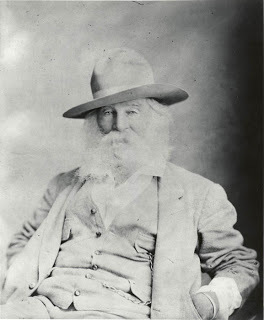 "The quality of truth in man supports itself through all changes"
"The quality of truth in man supports itself through all changes"
"Great is the earth, and the way it became what it is,
Do you imagine it is stopped at this? . . . . and the increase abandoned?
Understand then that it goes as far onward from this as this is from the times when it lay in covering waters and gases.
Great is the quality of truth in man,
The quality of truth in man supports itself through all changes,
It is inevitably in the man . . . . He and it are in love, and never leave each other." [1855]
 "The quality of truth in man supports itself through all changes"
"The quality of truth in man supports itself through all changes"
Published on February 24, 2013 07:00
February 23, 2013
Whitman: Great is youth (10 days to DR. BIRD)
Great is youth, and equally great is old age . . . . great are the day and night;
Great is wealth and great is poverty . . . . great is expression and great is silence.
Youth large lusty and loving . . . . youth full of grace and force and fascination,
Do you know that old age may come after you with equal grace and force and fascination?
Day fullblown and splendid . . . . day of the immense sun, and action and ambition and laughter,
The night follows close, with millions of suns, and sleep and restoring darkness.
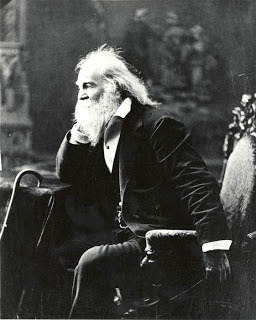 "and equally great is old age...."
"and equally great is old age...."
Great is wealth and great is poverty . . . . great is expression and great is silence.
Youth large lusty and loving . . . . youth full of grace and force and fascination,
Do you know that old age may come after you with equal grace and force and fascination?
Day fullblown and splendid . . . . day of the immense sun, and action and ambition and laughter,
The night follows close, with millions of suns, and sleep and restoring darkness.
 "and equally great is old age...."
"and equally great is old age...."
Published on February 23, 2013 07:00



